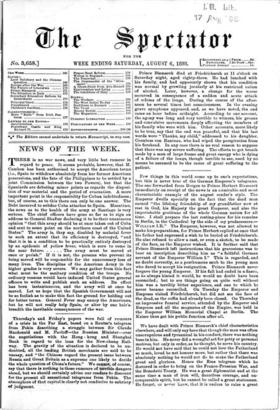Few things in this world come up to one's expectations,
but this is never true of the German Emperor's telegrams. The one forwarded from Bergen to Prince Herbert Bismarck immediately on receipt of the news is an aumirable and most characteristic example of the august sender's style. The Emperor dwells specially on the fact that the dead man earned "the lifelong friendship of my grandfather now at rest in God, his Majesty the great Emperor, and also the imperishable gratitune of the whole German nation for all time. I shall prepare the last resting-place for his remains in Berlin, in the Cathedral by the side of my predecessors.— WILLIAM I.R." The Emperor, however, was not allowed to make his preparations, for Prince Herbert replied at once that his father had expressed a wish to be buried at Friedrichsruh. He also refused to allow a cast, or even a sketch, to be made of the face, as the Emperor wished. It is further said that Prince Bismarck left instructions that his gravestone was to bear an inscription describing him as "a. faithful German servant of the Emperor William L" This is regarded, and no doubt correctly, as a posthumous snub to the young man who dared to accept his resignation. Prince Bismarck never forgave the young Emperor. If his fall had ended in a fiasco, as he always hinted it would, he would no doubt have been reconciled ; but to see things going on quite well without him was a terribly bitter experience, and one to which he never became reconciled. On Tuesday the Emperor and Empress visited Friedrichsruh, but did not see the face of the dead, as the coffin had already been closed. On Thursday an impressive funeral service, attended by the Emperor and Empress and all the magnates of the Empire, was held in the Emperor William Memorial Chapel at Berlin. The Kaiser thus got his public function after all.


































